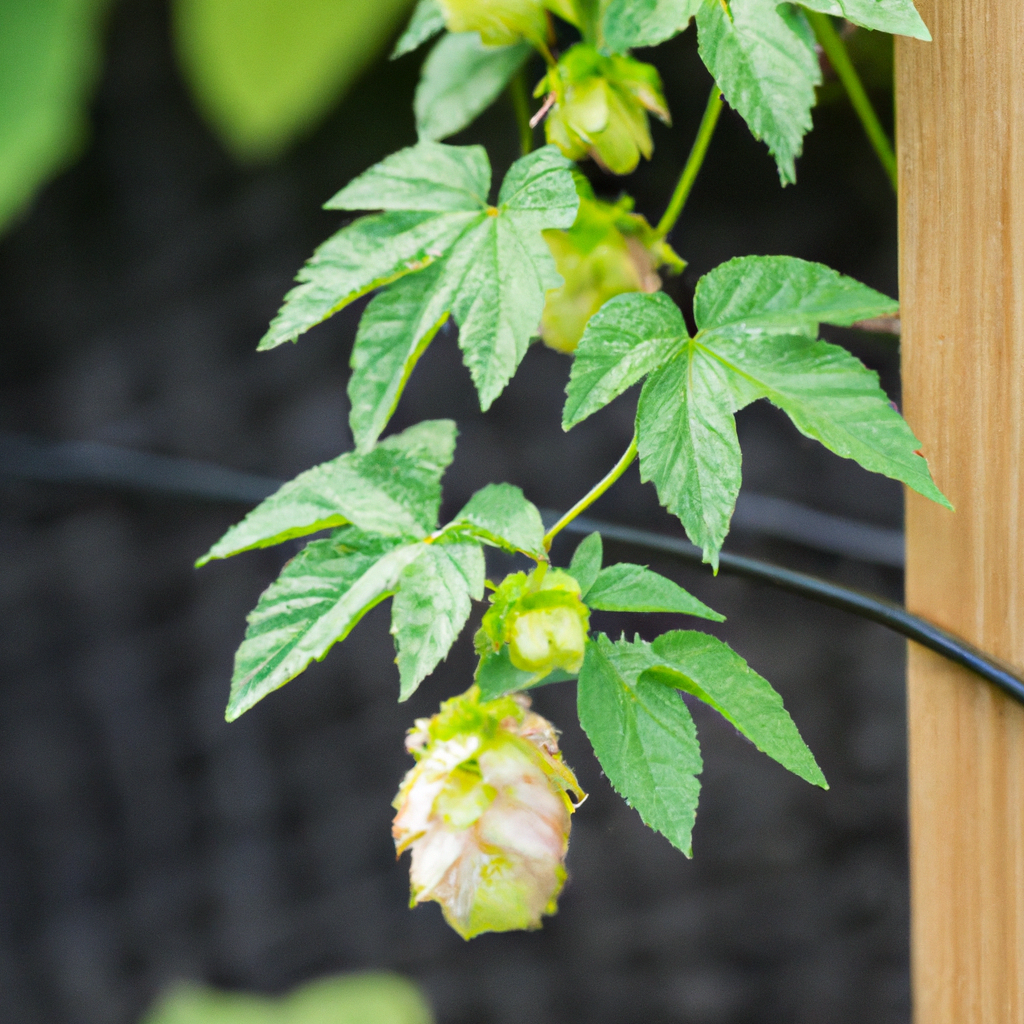Biological Name:
Japanese-Hops: Humulus japonicus
Natural Habitat:
Japanese hops, or Humulus japonicus, is a type of flowering plant that is native to Japan, China, and Korea. It grows in a variety of habitats, including forests, meadows, and along roadsides and streams.
Description:
Japanese-hops is a type of flowering plant that is commonly found in fields and other grassy areas. It is a member of the Cannabaceae family which also includes plants such as cannabis and hops. Japanese-hops is an annual or perennial plant that produces small green or brown flowers and clusters of seeds. The plant is often used as a cover crop to improve soil health and suppress weeds. It is also known for its ability to produce seeds that are similar in appearance to hops seeds but are not edible. In some areas Japanese-hops is considered a weed because of its ability to invade cultivated areas and cause allergies and other health problems.
Frequently Asked Questions (FAQs)
Q: Are Japanese hops invasive?
A: And while its vine-like growth appeals to many people as an ornamental plant, this species’ uncontrollable nature and irritating hairs make it a highly invasive plant across the Eastern United States, and Wisconsin’s forests are severely threatened by its introduction.
Source
Q: Do hops need to be cut back every year?
A: Hops only need pruning at/after harvest time and to prepare the plants for overwintering. You can also prune out weaker growth to leave room for stronger bines to flourish. Hops bines will die back in response to frost later in the season.
Source
Q: Do hops attract bugs?
A: Hi all – I’ve been growing hops in my backyard for a few years now, and I’ve learned that the vines LOVE attracting stuff – bugs, dirt, spider webs, other airborne things… I just pulled a bunch down, and as I was, lots of particulates were also coming off of them.
Source
Q: Is Japanese hop poisonous?
A: This plant has low severity poison characteristics. The Japanese Hop is an annual, climbing or twining vine in the hemp family. It is native to eastern Asia.
Source
Q: Do hops repel deer?
A: No deer will not eat hops if they can find other favorite meals. However, deer are pretty adaptive and will eat anything, including hops, if they cannot access the more palatable choices. If growing hops are native to your area, you might also have difficulty convincing them to leave your hops alone.
Source
Q: Are Japanese hops edible?
A: Ethnobotanical Uses: The seed oil can be used to make soap, the whole plant can be used as a diuretic and the young shoots and stems are edible (10).
Source
Q: What is Japanese hops good for?
A: Japanese hop was originally imported to the U.S. in the late 1800s for use as an Asian tonic and ornamental vine. It is still sold for these purposes today. Common hop (Humulus lupulus) contains bitter acids and essential oils used for flavoring and as preservative in beer.
Source
Q: Do Japanese hops flower?
A: Japanese hops is a dioecious, fast-growing, herbaceous annual vine in the Cannabinaceae family. Its leaves are simple, opposite, heart- shaped and palmately divided, usually into 5 lobes. Flowers are greenish and bloom mid to late summer.
Source
Q: What country has the best hops?
A: Germany produces the most hops in the world, followed by the United States.
Source
Q: Are hops plants invasive?
A: Japanese hops are an invasive species. Japanese hops are found in sunny riparian areas, grasslands, hayfields and roadsides. This vine aggressively climbs over trees and larger vegetation, creating dense patches and choking out other vegetation.
Source
Q: Do hops affect the liver?
A: Hop is an important agricultural plant that has been used to flavor beer for centuries and has been claimed to have sedative properties and to be useful for treatment of anxiety and insomnia. Hops have not been implicated in causing serum enzyme elevations or clinically apparent liver injury.
Source
Q: Do hops have a psychoactive effect?
A: THC is the cannabinoid found in the cannabis plant that produces those groovy, psychoactive effects. Hops do not contain THC, and therefore, do not naturally produce either a mind or body high. The buzz that you get from drinking beer isn’t the hops; it’s the alcohol.
Source
Q: Can you make beer with Japanese hops?
A: Hops are used in beer production to add bitter, floral, fruity, or citric flavors and essential oils for preservation. However, Japanese hops (Humulus japonicus) lack an essential resin for beer production. Common hops (H. lupulus) are a similar native species and can be used for beer production.
Source
Q: Why does Japanese beer taste different?
A: You may notice that Japanese beer tastes a bit lighter. Though the recipe of beer around the world is similar – Japanese beer is unique in that many (not all) use rice as part of their recipe. You’ll notice that flavor in beer brands like Asahi, Kirin and Sapporo. Japanese beers tend to have lower malt content as well.
Source
Q: What are Japanese hops used for?
A: Japanese hop was originally imported to the U.S. in the late 1800s for use as an Asian tonic and ornamental vine. It is still sold for these purposes today. Common hop (Humulus lupulus) contains bitter acids and essential oils used for flavoring and as preservative in beer.
Source
Q: What hops are used in Sapporo?
A: Sorachi Ace (Hop) is a hop developed by Dr Yoshitada Mori of Sapporo Breweries in Japan in the late 1970s. Brewer’s Gold was crossed with Saaz, and the progeny was crossed with a Beikei No. 2 male.
Source
Q: Is there a Japanese IPA?
A: English-style Japanese IPAs have relatively subdued tastes of hops and malt and make an excellent “gateway IPA†for neophytes or IPA old-timers who enjoy lighter flavors. On the other hand, double or imperial IPAs have twice the hops for an in-your-face type of IPA perfect for “hopheads,†or drinkers who love hops.
Source
Q: What is the number 1 beer in Japan?
A: According to country-wide consumption, Asahi Super Dry is the most popular Japanese beer in Japan. Its main competitor is Sapporo Premium. For its signature dry but crisp flavor, it’s arguably the most popular Japanese beer outside of the country as well.
Source
Q: Why is Japanese beer dry?
A: Asahi Super Dry Beer is a rice lager from Japan. These beers are prepared with rice and malted barley, just like American lagers. As a result, the beer has a light colour and flavour profile. There is also more carbonation, which necessitates a drier finish.
Source
Q: How do I get rid of Japanese hops?
A: Repeated foliar application of a systemic herbicide containing glyphosate can be an effective tool for controlling Japanese hops. Apply in the early summer to prevent seed production. Depending on the site considerations, foliar application could be combined with a pre-emergent herbicide for more effective control.
Source
Q: What is Japanese hops used for?
A: Japanese hop was originally imported to the U.S. in the late 1800s for use as an Asian tonic and ornamental vine. It is still sold for these purposes today. Common hop (Humulus lupulus) contains bitter acids and essential oils used for flavoring and as preservative in beer.
Source
Q: How do you identify Japanese hop?
A: The climbing or trailing growth habit, conspicuously 5-lobed leaves, and stems with downward pointed prickles are all characteristics that help in the identification of Japanese hops.
Source
Q: How do you keep Japanese beetles off hops?
A: Traditional spraying with chemicals such as bifenthrins or pyrethroids are all commonly used to control adult beetles on hops.
Source
Q: What kills Japanese beetles in Japan?
A: One of the more common natural enemies attacking Japanese beetle adults is a group of parasitoids referred to as tachinid flies. Tachinid flies are true flies (Diptera) in the family Tachinidae. There are over 1,500 known species of tachinid flies and they can vary in size (3-14 mm) and color (black, grey, and orange).
Source
Q: What rids Japanese beetles?
A: Start by spraying the affected plants with Japanese Beetle Killer (pyrethrin) or neem at the first sign of attack. Pyrethrin-based insecticide is a safe and effective way to control these pests on vegetables, grapes, raspberries, flowers, roses, trees and shrubs.
Source

